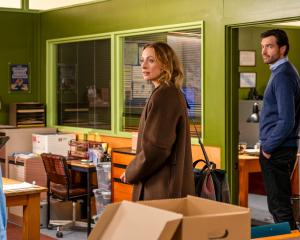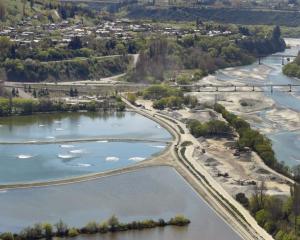
Today councillors Penny Clark, Craig Ferguson and John Macdonald will hear submissions on a proposal to permanently pedestrianise upper Beach St, from Camp St to Cow Lane, following a 12-month trial.
A total of 46 submissions were received — 32 in support, 12 opposed and two neutral.
Former councillor Gillian Macleod said she agreed with the pedestrianisation but had been "dismayed" by the way the street had been allowed to fill up.
"It is extremely tacky and has downgraded the experience, which was actually better when it was a shared street. At least it was kept free of tat. It is not a pleasant place to linger and the view shaft has been obliterated by the coffee caravan, plastic sheep, hawkers’ clothing and impromptu markets."
Resident Evan Jenkins was neutral in his submission but also believed the concept needed work.
He said early in the trial the street looked "cold, deserted and forlorn".
"More recently it has the appearance of a freedom camping precinct. Racks of clothes outside a shop as if somebody is hanging their washing, a tent, caravan and parked camper van, a few grazing sheep ... If it is not going to be done exceptionally well with some innovative, even unique and interesting features, then do not do it."
But DowntownQT general manager Steve Wilde said, by and large, the trial had been successful.
It had not been detrimental to businesses in the street and permanently closing it to traffic would not harm their viability.
Surveys showed about 80% of business people were in favour of the proposal but testing of various activities in the street had provided mixed results.
Initially, DTQT offered to let businesses in the street trade from a market stall each Friday, which included gazebos. The gazebos were "wholly rejected" by the majority of those visiting the street and the business community.
Then DTQT opened up the market to outside stallholders. About 30 now attended the Friday Market, but it was unlikely that would continue after the licence to occupy ended at the end of this month because many of the businesses believed it affected their profit, Mr Wilde said.
He said work was continuing on ways to improve the atmosphere on the street. Bollards and road markings, left in during the trial, did not provide a welcoming pedestrian atmosphere.
"These need to be removed, along with further redevelopment of the streetscape itself, which will then truly realise the potential Beach St holds.
"Even if the council decides not to proceed with a permanent closure, removal of the bollards should still be considered, with pedestrians having the right of way over traffic."












